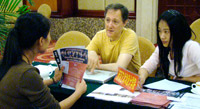
When I go to China to interview students who are applying to NSCAD’s Master of Design program, I look at their portfolios and I talk to them. What I’m looking for is what I call “intellectual curiosity.” But when I tell them that this is the quality that will best determine their success in this program, they give me the old ‘thousand-yard stare.’ It just isn’t a concept that most students have grasped in their English instruction.
So I went to Google Translate, and typed in “intellectual curiosity.” It came back with the Chinese characters. When I translated it back, it returned “thirst for knowledge.” Well, it’s not exactly what I’m looking for, but it’s certainly better than I expected.
Character by character, 求 means “seek,” 知 means “know,” and 欲 means “appetite,” “longing,” or “wish.”
How did I know if it was a correct translation? I asked my Chinese friends:
…I am not sure if this is exactly what I want, because a designer looks at the world differently than, maybe, a scientist. A scientist is happy to know things, while a designer is happy to get approximate answers. Maybe for a designer, it is a “thirst to ask questions”?…
Is this translation accurate, or is there a better way to express it?
Faye Wong wrote:
In Chinese there are also different feelings in one word.
I do not think “thirst for knowledge” is a good translation for 求知欲. 求知欲 is kind like curiosity, and kind of like a desire of “why”…
Carol Chen wrote:
… I think google has given you a right answer. 求知欲 means “thirst for knowledge”, and it also express that one’s eager to learn something new, or someone desire to learn some knowledge. These are my thoughts, and you might also look at others to make sure.
Song Keyu wrote:
“求知欲” is not an accurate translation of “intellectual curiosity”, considering to the exact reason that you talked about. But I couldn’t come up with a better one at this moment, at least not a wildly-used one like this.
But there are some good qualities about this phrase that make it closer to to what you want to say than other translations:
- It is an ancient Chinese expression, which actually feels “intellectual”. (Ancient intellectuals were not scientists.)
- Though the word “知” means “knowledge” nowadays, but in the past, it equaled to the word “智”, which means “intellectual” and “wisdom”.
- It is so widely used that the meaning expands to a very large range, so when people say it, they are not specifically focusing on the a scientific respect.
- It is very percise and beautiful.
I should add that Song asked her father, a noted novelist in Hunan, about this question:
My dad didn’t find a better word either. He agrees with me maybe you should use that one. We discussed some new sayings of that meaning, which are literal translations, but they are all kind of lame.
So how did Google get it so right?
According to the Google Translate FAQ uses what they call “Machine Statistical Translation:”
Our system takes a different approach: we feed the computer billions of words of text, both monolingual text in the target language, and aligned text consisting of examples of human translations between the languages. We then apply statistical learning techniques to build a translation model. We’ve achieved very good results in research evaluations.
And where did they get those billions of words of text that are translation correlations? According to Reuters, they went to the United Nations and the European Union. Both of these institutions have armies of translators that convert text from English and French to other languages, resulting in hundreds of thousands of laws, reports, and legal judgements. Google obtained as many different documents as possible and ran them through their translation software. Somewhere in a UN document is the phrase “intellectual curiosity,” and some wise apparatchik has skillfully translated it into Mandarin.
Thank you, U.N., thank you, Google.